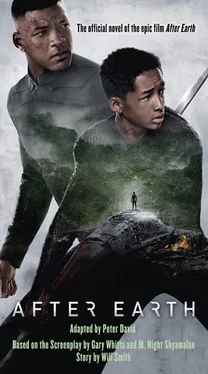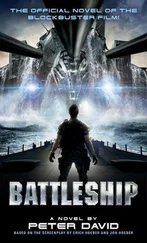It was jarring to think that his father could be broken like any other human being. Cypher had always been bigger than life to Kitai. More than a hero.
And now he needs help from somebody like me .
He pressed a button, and the elevator began to rise. He craned his neck to watch his father as he ascended.
Cypher called down to him. “Inventory. Full assets. Now.”
Because I’m just standing around gawking. I get it . “On it,” Kitai said.
Occupying the space where the ship’s navigator sat—or, rather, would be sitting if the navigator were still alive—Cypher considered the portion of the pilot’s control panel that hadn’t been wrecked in the crash.
He needed to access the panel despite the damage to his left leg. With that in mind, he manipulated the cargo loader’s controls, using the machine like an adjustable gurney. Little by little he tilted himself forward until he was sitting upright. Then he propped his leg on the console beside him.
That done, Cypher placed his palm on a terminal to activate the cockpit computers. The initial burst of power gave him hope that he and Kitai might get out of this spot after all.
A hologram flashed in front of him: IDENTITY VERIFIED: GENERAL CYPHER RAIGE.
Having recognized him, the computers booted up with a soft hum. He tapped out a command, and a holographic display appeared over the panel, spitting out initial readings: MAIN CABIN BREACH… SELF-SEALING IN PROGRESS… TRANSPORT SHIP… CONDITION CRITICAL.
Cypher glanced at the recorder on the other side of the cockpit. Then he spoke and watched voice waves undulate on one of the monitors, indicating that the recorder was doing its job.
“General Cypher Raige,” he said. “First quarter Earth day. Crash-landed.”
Kitai dragged the navigator’s inert form along the deck and tried as hard as he could not to acknowledge the fact that he was pulling a corpse.
Unfortunately, it wasn’t the first corpse he had hauled that way since the crash. But it’s the last . His back was sore from the effort since each of the bodies he had dragged had outweighed him, but he wasn’t complaining.
It could have been worse. It could have been me that died in the crash .
When he reached an open hatch, he stopped. Clouds of cold white vapor rose from the opening. A sign beside it read “NITRO STORAGE CONTAINER.”
They were Rangers, the navigator and the others. It was only right that their bodies be preserved. That way, when someone from Nova Prime found the ship—or this part of it, anyway—the dead could be transported back to the world of their birth and given a decent burial. Not to mention the fact that a decomposing corpse could attract predators and maybe even an Ursa.
As gently as he could, Kitai deposited the navigator into the container below. The man looked more like a statue than someone who had been alive not too long ago. With a shiver of revulsion, Kitai swung the hatch door closed.
And what about me and Dad? he wondered. If we don’t make it, who will preserve our bodies? Again he shuddered.
Supplies, he thought, putting the hatch and all thoughts of its contents behind him. Forget the bodies. Got to get supplies .
Little by little, he lugged everything he found back to the cockpit, where Cypher was waiting for him. Before long, he had built up a considerable pile. That was a good thing, he supposed.
The bloodstain on Cypher’s leg was a bad one, and it was spreading. Worse, it was dripping onto the floor. Kitai had noticed it earlier—he couldn’t help it—though his father had seemed to want to distract him from the sight.
“That’s it,” Kitai said, placing a med-kit and Cypher’s personal kit bag beside the pile. He was mentally and physically drained, more so than he had realized when he’d been busy collecting everything. How long had it been since the crash? He had no idea, no idea at all.
His mind was even more tired than his body. The things he had seen in the last few hours, the things he had done… he wanted to forget them, pretend they had never happened. But they had. His father’s injuries, for instance. They weren’t going to go away. They were real. And Kitai wondered if he would have to deal with them.
“I need you to focus right now,” Cypher said, bringing Kitai out of his reverie. “Assets?”
One shell-shocked teenager. One badly damaged Prime Commander , Kitai thought.
“Cadet?” Cypher said calmly. “I need an accounting of our assets.”
Kitai struggled to focus. He looked to the pile of supplies in front of him, aware that his father was studying every nuance of his body language: every facial twitch, every stutter, everything. After all, that was what he did. It was what made him who he was.
“Four bodies,” Kitai reported. “I put them in the nitro compartment. Radio nonoperational.” That had been a disappointment, of course. “Four Ranger packs. Cabin pressure stable.” What else? Oh, yeah… “Five—no, six cutlasses. One emergency med-kit. And I got your bag from the troop bay.”
Was that it? He thought it was. Not that it seemed to matter to his father. Cypher had turned away before Kitai had finished his list and begun manipulating the cockpit controls. Suddenly, a holographic image of a landscape rose over the console. It was formed by thousands of wavy lines. And there was a marker blinking on the holographic landscape.
Cypher stared at the blinking marker, his expression grim, for a long time. Finally, he turned to Kitai and said, “Hand me the med-kit. Ranger pack.”
Kitai didn’t know why his father needed those things, but he moved to comply. Picking up the med-kit and the Ranger pack, he gave them to Cypher, who placed them in his lap. Then he took his son’s wrist, turned it over, and activated the naviband on Kitai’s lifesuit.
Instantly, lines of data crawled around the naviband, creating what looked like a holographic bracelet. Kitai had never seen a naviband do such a thing before.
At the same time, the monitor to Cypher’s right filled with a cascade of numbers and graphs, all of which matched those on Kitai’s naviband. It took Kitai a moment to realize what his father was doing: syncing the band with the cockpit’s computers.
But why? Kitai felt panic creeping back into his bones.
“Cadet,” Cypher said, “center yourself.”
Kitai did so. Slowly, he became calm again. Cypher seemed satisfied. Sitting back, he looked into Kitai’s eyes, and Kitai looked back. The weight of their predicament hung between them, a shared burden.
Then Cypher began to speak. “The emergency beacon you brought me will fire a distress signal deep into space.”
Kitai nodded. But it seemed to him that his father was speaking to himself as much as to his son, trying to cut through the haze of his pain by thinking out loud.
“But it’s damaged,” Cypher said.
“There is another one in the tail section of our ship.”
Kitai’s heart fell. The tail section was gone, and more than likely, the beacon was gone, too. But Cypher didn’t seem daunted by what he had learned. If anything, he seemed intrigued.
As Kitai watched, his father manipulated the controls and altered the holographic landscape. In the grainy computerized image, Kitai could make out mountain ranges, rivers, valleys, forests, deserts, small storm patterns, animals, birds, and so on.
Cypher pointed to the screen. “This is us here . I can’t get an accurate reading, but the tail is somewhere in this area, approximately one hundred kilometers from here.” He glanced at his son. “We need that beacon.”
Читать дальше












